#terry and neil interview
Text


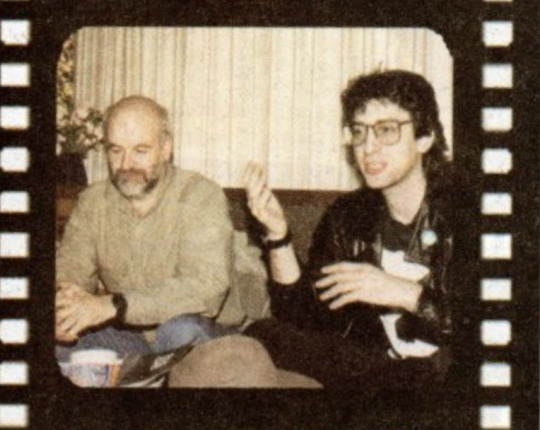







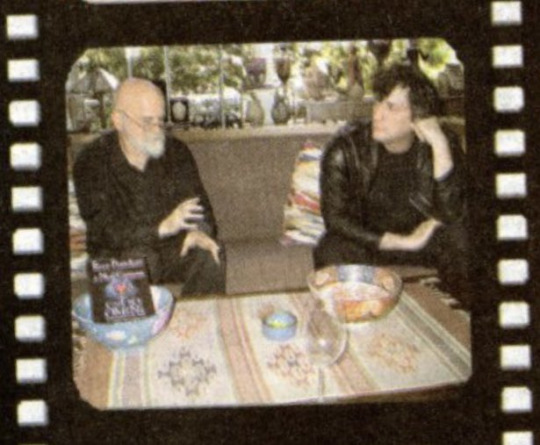

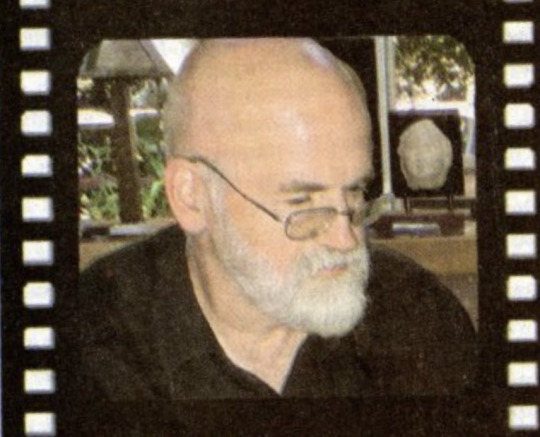



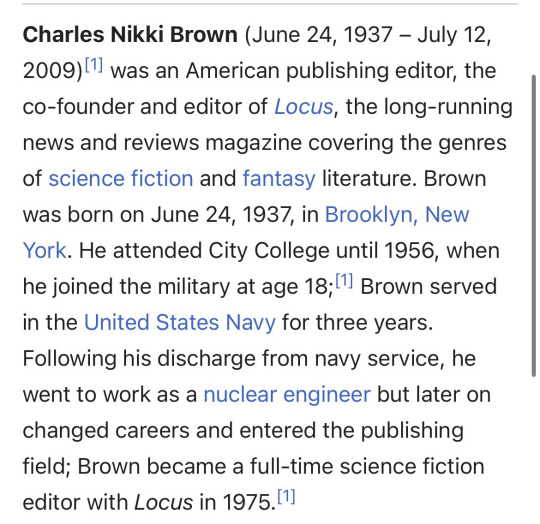
(trying to see what Neil has on his shirt in 1991... it's a skull isn't it? :D<3
@chrisondra-exists replied to your post “(trying to see what Neil has on his shirt in...”:
Pretty sure that's the Misfits band logo :D
ooh thank you! :D <3)
tweet
#good omens#terry pratchett#neil gaiman#charles n brown#interview#terry interview#neil interview#terry and neil interview#photos#terry and neil#btb#❤
7K notes
·
View notes
Text
Sir Terry Pratchett: on writing Good Omens with Neil Gaiman
I love the whole interview but this little snippet most of all:
Terry: “You can usually bet, and I’m sure Neil Gaiman would say the same thing, that, uh, if I go into a bookstore to do a signing and someone presents me with three books, the chances are that one of them is going to be a very battered copy of Good Omens; and it will smell as if it’s been dropped in parsnip soup or something in and it’s gone fluffy and crinkly around the edges and they’ll admit that it’s the fourth copy they’ve bought”.
You can never own enough Good Omens copies.
#good omens#terry pratchett#neil gaiman#crowley#aziraphale#ineffable husbands#good omens fun facts#good omens interviews#this place is lacking on Terry interviews#i will bring them here#parsnip#gnu terry pratchett
14K notes
·
View notes
Text
✨ hugely enticing ✨
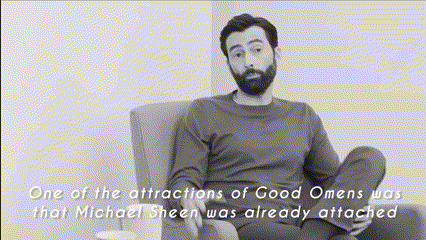


Source
#david tennant#michael sheen#good omens#good omens 2#crowley x aziraphale#aziracrow#ineffable husbands#aziraphale#crowley#neil gaiman#terry pratchett#david tennant interview
1K notes
·
View notes
Text
Neil Gaiman does a podcast with David Tennant (2020)
The podcast is here, and there's a transcript of parts of it here. It's all really interesting!
Here's what really resonates for me. While talking about the opening flashbacks of s1e3 (emphasis is mine):
"Neil: It was utterly budget-busting and I also knew that it would make everything else work. And also it would make the scene I knew I was going to write in episode 3… it would turn that from a scene that was a bit sniffly into one that would break people’s hearts [yep, the bandstand scene], because you’d actually spent 28 minutes watching the ups and downs of these two on Earth for 6000 years becoming the only important thing in each other’s lives and here is this moment where there are actually… they have two utterly disparate philosophies of existing and Aziraphale cannot go off with Crowley and Crowley cannot leave without him but he has to, and you wind up with a ‘Have a nice doomsday’ line. But the excitement that I had of writing that stuff and the joy I had knowing that we’re going to watch the relationship open like a flower to us, ending in the 1960 with the hand-over of the holy water and there wouldn’t be a dry eye in the house - and I knew that because it did that for me - them watching what you and Michael brought to it and it became the most most glorious tentative friendship over thousands of years, that then becomes sort of peculiar and flirty and weird and prickly and funny and glorious, and, you know, it was the one that won me the Nebula Award."
This absolutely frames season 2 for me, and in particular the final fifteen minutes, which are season 2's heartbreaking bandstand scene. During season 2, we watched their relationship once again open like a glorious, flirty flower, still the only important thing in each other's lives, until their utterly disparate philosophies of existing separated them and broke all of our hearts.
But they came back together after the bandstand, and they will again after season 2 🤞❤️
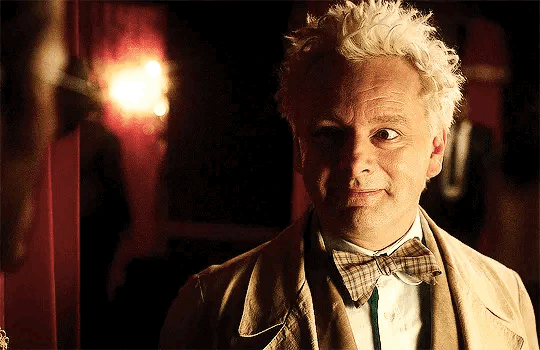
#david tennant#neil gaiman#good omens#good omens season 1#good omens season 2#Interview#podcast#good omens meta#aziraphale#crowley#good omens analysis#ineffable husbands#love#gnu terry pratchett#terry pratchett#final fifteen#good omens speculation#good omens bandstand#good omens season 3#ineffable lovers#ineffable fandom#ineffable divorce#ineffable idiots#ineffable spouses
225 notes
·
View notes
Text
Good Omens graphic novel interview.
7 Days left in the Kickstarter campaign.
865 notes
·
View notes
Text
I AM SO FUCKING EXCITED FOR S3 OMFG!!!!!
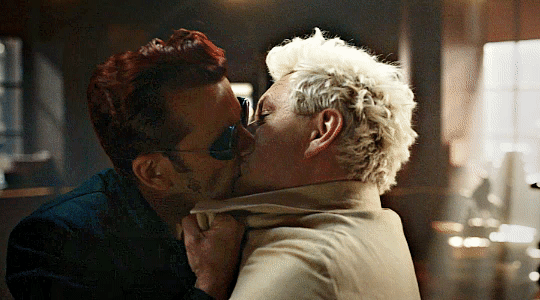
Hope they kiss properly and SAVE THE FUCKING WORLD!!!!!!
#good omens#aziracrow#aziraphale#crowley#ineffable husbands#neil gaiman#gomens#angel#gomens s2#prime video#good omens spoilers#good omens 2#gos3#good omens comic#good omens fanart#no nightingales#pls neil gaiman#neil interview#neil and terry#anthony j crowley#crowley x aziraphale#aziraphale x crowley
56 notes
·
View notes
Note
And it all started with a gay angel and demon.... I think that's beautiful
It all started with a demon named Crawleigh who got split into two people. And that is beautiful.
31 notes
·
View notes
Text
| | | | | | | | | | | | | | | | | | |
Click the Read More for a list of tags commonly used on this blog.
| | | | | | | | | | | | | | | | | | |
Anything related to Good Omens:
#good omens
Anything not related to Good Omens:
#not good omens
Cast & Crew tags:
#neil gaiman #david tennant #michael sheen #terry pratchett ...etc
Character tags:
#aziraphale #aj crowley #muriel #gabriel #beelzebub #nina #maggie #metatron ...etc
Content tags:
#fanart #fan comic #fanimation #fanimatic #gif #video #audio #fan edit
Ship tags:
#ineffable idiots (previously #ineffable husbands) #ineffable bureaucracy
Anything with fem!Aziraphale/Crowley:
#ineffable ladies
Anything pertaining to (Spoiler Alert) you-know-what in 2×06:
#ineffable divorce
Anything regarding the upcoming (though not for a long time now) Good Omens 3:
#good omens 3 #good omens 3 speculation
Anything regarding the upcoming Good Omens Graphic Novel on Kickstarter:
#good omens graphic novel
Some miscellaneous tags:
#interview #good omens bts #the bentley #angel crowley #snake eyes #snake crowley #behind the scenes #fire extinguisher #snakes #plants #good omens graphic novel #a nightingale sang in berkeley square ...etc
-------------------------------------------------------
For your convenience, this pinned post has been tagged with the majority of the aforementioned tags; Simply click on one of your choosing to search this blog for it.
-------------------------------------------------------
※ More tags will be added to this list later on.
| | | | | | | | | | | | | | | | | | |
#good omens#aj crowley#aziraphale#good omens 2#neil gaiman#ineffable husbands#ineffable idiots#ineffable bureaucracy#ineffable ladies#david tennant#michael sheen#terry pratchett#ineffable divorce#the bentley#angel crowley#interview#good omens bts#snake eyes#snake crowley#a nightingale sang in berkeley square#behind the scenes#good omens graphic novel#good omens 3#good omens 3 speculation
37 notes
·
View notes
Text
okay but is it me or do we seriously miss something in literature??? where are my gay main character boys in historical fictions??? living their lives to the fullest??? with their clique??? hiding but going wild????
i'm talking about miles maitland, francis abernathy, robbie ross, lestat, dorian gray, allen ginsberg... just bloody oscar wilde vibe and mentality!!!!
I NEED BOOKS!

#literature#books#reader struggles#gay characters in works are still not as common as id like#miles maitland#robbie ross#francis abernathy#oscar wilde#just look at all the characters michael sheen has played and you'll know what i mean#vile bodies#we only live once#interview with the vampire#lestat de lioncourt#neil gaiman and terry pratchett#good omens#michael sheen#but in BOOKS
14 notes
·
View notes
Text
How Michael Met Neil
original direct link [MP3]
(Neil, if you see this, please feel free to grab the transcript and store on your site; I had no easy way of contacting you.)
DAVID TENNANT: Tell me about @neil-gaiman then, because he's in that category [previously: “such a profound effect on my life”] as well.
MICHAEL SHEEN: So this is what has brought us together.
DAVID: Yes.
MICHAEL: To the new love story for the 21st century.
DAVID: Exactly.
MICHAEL: So when I went to drama school, there was a guy called Gary Turner in my year. And within the first few weeks, we were doing something, having a drink or whatever. And he said to me, “Do you read comic books?”
And I said, “No.” I mean, this is … what … '88? '88, '89. So it was … now I know that it was a period of time that was a big change, transformation going through comic books. Rather than it being thought of as just superheroes and Batman and Superman, there was this whole new era of a generation of writers like Grant Morrison.
DAVID: The kids who'd grown up reading comic books were now making comic books
MICHAEL: Yeah, yeah, and starting to address different kinds of subjects through the comic book medium. So it wasn't about just superheroes, it was all kinds of stuff going on – really fascinating stuff. And I was totally unaware of this.
And so this guy Gary said to me, "Do you read them?" And I said, "No." And he went, "Right, okay, here's The Watchman [sic] by Alan Moore. Here's Swamp Thing. Here's Hellblazer. And here's Sandman.”
And Sandman was Neil Gaiman's big series that put his name on the map. And I read all those, and, just – I was blown away by all of them, but particularly the Sandman stories, because he was drawing on mythology, which was something I was really interested in, and fairy tales, folklore, and philosophy, and Shakespeare, and all kinds of stuff were being mixed up in this story. And I absolutely loved it.
So I became a big fan of Neil's, and started reading everything by him. And then fairly shortly after that, within six months to a year, Good Omens the book came out, which Neil wrote with Terry Pratchett. And so I got the book – because I was obviously a big fan of Neil's by this point – read it, loved it, then started reading Terry Pratchett’s stuff as well, because I didn't know his stuff before then – and then spent years and years and years just being a huge fan of both of them.
And then eventually when – I'd done films like the Underworld films and doing Twilight films. And I think it was one of the Twilight films, there was a lot of very snooty interviews that happened where people who considered themselves well above talking about things like Twilight were having to interview me … and, weirdly, coming at it from the attitude of 'clearly this is below you as well' … weirdly thinking I'm gonna go, 'Yeah, fucking Twilight.”
And I just used to go, "You know what? Some of the greatest writing of the last 50-100 years has happened in science fiction or fantasy." Philip K Dick is one of my favorite writers of all time. In fact, the production of Hamlet I did was mainly influenced by Philip K Dick. Ursula K. Le Guin and Asimov, and all these amazing people. And I talked about Neil as well. And so I went off on a bit of a rant in this interview.
Anyway, the interview came out about six months later, maybe. Knock on the door, open the door, delivery of a big box. That’s interesting. Open the box, there's a card at the top of the box. I open the card.
It says, From one fan to another, Neil Gaiman. And inside the box are first editions of Neil's stuff, and all kinds of interesting things by Neil. And he just sent this stuff.
DAVID: You'd never met him?
MICHAEL: Never met him. He'd read the interview, or someone had let him know about this interview where I'd sung his praises and stood up for him and the people who work within that sort of genre as being like …
And he just got in touch. We met up for the first time when he came to – I was in Los Angeles at the time, and he came to LA. And he said, "I'll take you for a meal."
I said, “All right.”
He said, "Do you want to go somewhere posh, or somewhere interesting?”
I said, "Let's go somewhere interesting."
He said, "Right, I'm going to take you to this restaurant called The Hump." And it's at Santa Monica Airport. And it's a sushi restaurant.
I was like, “Right, okay.” So I had a Mini at the time. And we get in my Mini and we drive off to Santa Monica Airport. And this restaurant was right on the tarmac, like, you could sit in the restaurant (there's nobody else there when we got there, we got there quite early) and you're watching the planes landing on Santa Monica Airport. It's extraordinary.
And the chef comes out and Neil says, "Just bring us whatever you want. Chef's choice."
So, I'd never really eaten sushi before. So we sit there; we had this incredible meal where they keep bringing these dishes out and they say, “This is [blah, blah, blah]. Just use a little bit of soy sauce or whatever.” You know, “This is eel. This is [blah].”
And then there was this one dish where they brought out and they didn't say what it was. It was like “mystery dish”, we had it ... delicious. Anyway, a few more people started coming into the restaurant as time went on.
And we're sort of getting near the end, and I said, "Neil, I can't eat anymore. I'm gonna have to stop now. This is great, but I can't eat–"
"Right, okay. We'll ask for the bill in a minute."
And then the door opens and some very official people come in. And it was the Feds. And the Feds came in, and we knew they were because they had jackets on that said they were part of the Federal Bureau of Whatever. And about six of them come in. Two of them go … one goes behind the counter, two go into the kitchen, one goes to the back. They've all got like guns on and stuff.
And me and Neil are like, "What on Earth is going on?"
And then eventually one guy goes, "Ladies and gentlemen, if you haven't ordered already, please leave. If you're still eating your meal, please finish up, pay your bill, leave."*
[* - delivered in a perfect American ‘serious law agent’ accent/impression]
And we were like, "Oh my God, are we poisoned? Is there some terrible thing that's happened?"
We'd finished, so we pay our bill. And then all the kitchen staff are brought out. And the head chef is there. The guy who's been bringing us this food. And he's in tears. And he says to Neil, "I'm so sorry." He apologizes to Neil. And we leave. We have no idea what happened.
DAVID: But you're assuming it's the mystery dish.
MICHAEL: Well, we're assuming that we can't be going to – we can't be – it can't be poisonous. You know what I mean? It can't be that there's terrible, terrible things.
So the next day was the Oscars, which is why Neil was in town. Because Coraline had been nominated for an Oscar. Best documentary that year was won by The Cove, which was by a team of people who had come across dolphins being killed, I think.
Turns out, what was happening at this restaurant was that they were having illegal endangered species flown in to the airport, and then being brought around the back of the restaurant into the kitchen.
We had eaten whale – endangered species whale. That was the mystery dish that they didn't say what it was.
And the team behind The Cove were behind this sting, and they took them down that night whilst we were there.
DAVID: That’s extraordinary.
MICHAEL: And we didn't find this out for months. So for months, me and Neil were like, "Have you worked anything out yet? Have you heard anything?"
"No, I haven't heard anything."
And then we heard that it was something to do with The Cove, and then we eventually found out that that restaurant, they were all arrested. The restaurant was shut down. And it was because of that. And we'd eaten whale that night.
DAVID: And that was your first meeting with Neil Gaiman.
MICHAEL: That was my first meeting. And also in the drive home that night from that restaurant, he said, and we were in my Mini, he said, "Have you found the secret compartment?"
I said, "What are you talking about?" It's such a Neil Gaiman thing to say.
DAVID: Isn't it?
MICHAEL: The secret compartment? Yeah. Each Mini has got a secret compartment. I said, "I had no idea." It's secret. And he pressed a little button and a thing opened up. And it was a secret compartment in my own car that Neil Gaiman showed me.
DAVID: Was there anything inside it?
MICHAEL: Yeah, there was a little man. And he jumped out and went, "Hello!" No, there was nothing in there. There was afterwards because I started putting...
DAVID: Sure. That's a very Neil Gaiman story. All of that is such a Neil Gaiman story.
MICHAEL: That's how it began. Yeah.
DAVID: And then he came to offer you the part in Good Omens.
MICHAEL: Yeah. Well, we became friends and we would whenever he was in town, we would meet up and yeah, and then eventually he started, he said, "You know, I'm working on an adaptation of Good Omens." And I can remember at one point Terry Gilliam was going to maybe make a film of it. And I remember being there with Neil and Terry when they were talking about it. And...
DAVID: Were you involved at that point?
MICHAEL: No, no, I wasn't involved. I just happened to have met up with Neil that day.
DAVID: Right.
MICHAEL: And then Terry Gilliam came along and they were chatting, that was the day they were talking about that or whatever.
And then eventually he sent me one of the scripts for an early draft of like the first episode of Good Omens. And he said – and we started talking about me being involved in it, doing it – he said, “Would you be interested?” I was like, "Yeah, of course." I went, "Oh my God." And he said, "Well, I'll send you the scripts when they come," and I would read them, and we'd talk about them a little bit. And so I was involved.
But it was always at that point with the idea, because he'd always said about playing Crowley in it. And so, as time went on, as I was reading the scripts, I was thinking, "I don't think I can play Crowley. I don't think I'm going to be able to do it." And I started to get a bit nervous because I thought, “I don't want to tell Neil that I don't think I can do this.” But I just felt like I don't think I can play Crowley.
DAVID: Of course you can [play Crowley?].
MICHAEL: Well, I just on a sort of, on a gut level, sometimes you have it on a gut level.
DAVID: Sure, sure.
MICHAEL: I can do this.
DAVID: Yeah.
MICHAEL: Or I can't do this. And I just thought, “You know what, this is not the part for me. The other part is better for me, I think. I think I can do that, I don't think I could do that.”
But I was scared to tell Neil because I thought, "Well, he wants me to play Crowley" – and then it turned out he had been feeling the same way as well. And he hadn't wanted to mention it to me, but he was like, "I think Michael should really play Aziraphale."
And neither of us would bring it up. And then eventually we did. And it was one of those things where you go, "Oh, thank God you said that. I feel exactly the same way." And then I think within a fairly short space of time, he said, “I think we've got … David Tennant … for Crowley.” And we both got very excited about that.
And then all these extraordinary people started to join in. And then, and then off we went.
DAVID: That's the other thing about Neil, he collects people, doesn't he? So he'll just go, “Oh, yeah, I've phoned up Frances McDormand, she's up for it.” Yeah. You're, what?
MICHAEL: “I emailed Jon Hamm.”
DAVID: Yeah.
MICHAEL: And yeah, and you realize how beloved he is and how beloved his work is. And I think we would both recognise that Good Omens is one of the most beloved of all of Neil's stuff.
DAVID: Yes.
MICHAEL: And had never been turned into anything.
DAVID: Yeah.
MICHAEL: And so the kind of responsibility of that, I mean, for me, for someone who has been a fan of him and a fan of the book for so long, I can empathize with all the fans out there who are like, “Oh, they better not fuck this up.”
DAVID: Yes.
MICHAEL: “And this had better be good.” And I have that part of me. But then, of course, the other part of me is like, “But I'm the one who might be fucking it up.”
DAVID: Yeah.
MICHAEL: So I feel that responsibility as well.
DAVID: But we have Neil on site.
MICHAEL: Yes. Well, Neil being the showrunner …
DAVID: Yeah. I think it takes the curse off.
MICHAEL: … I think it made a massive difference, didn't it? Yeah. You feel like you're in safe hands.
DAVID: Well, we think. Not that the world has seen it yet.
MICHAEL (grimly): No, I know.
DAVID: But it was a -- it's been a -- it's been a joy to work with you on it. I can't wait for the world to see it.
MICHAEL: Oh my God. Oh, well, I mean, it's the only, I've done a few things where there are two people, it's a bit of a double act, like Frost-Nixon and The Queen, I suppose, in some ways. But, and I've done it, Amadeus or whatever.
This is the only thing I've done where I really don't think of it as “my character” or “my performance as that character”. I think of it totally as us.
DAVID: Yeah.
MICHAEL: The two of us.
DAVID: Yes.
MICHAEL: Like they, what I do is defined by what you do.
DAVID: Yeah.
MICHAEL: And that was such a joy to have that experience. And it made it so much easier in a way as well, I found, because you don't feel like you're on your own in it. Like it's totally us together doing this and the two characters totally complement each other. And the experience of doing it was just a real joy.
DAVID: Yeah. Well, I hope the world is as excited to see it as we are to talk about it, frankly.
MICHAEL: You know, there's, having talked about T.S. Eliot earlier, there's another bit from The Wasteland where there's a line which goes, These fragments I have shored against my ruin.
And this is how I think about life now. There is so much in life, no matter what your circumstances, no matter what, where you've got, what you've done, how much money you got, all that. Life's hard. I mean, you can, it can take you down at any point.
You have to find this stuff. You have to like find things that will, these fragments that you hold to yourself, they become like a liferaft, and especially as time goes on, I think, as I've got older, I've realized it is a thin line between surviving this life and going under.
And the things that keep you afloat are these fragments, these things that are meaningful to you and what's meaningful to you will be not-meaningful to someone else, you know. But whatever it is that matters to you, it doesn't matter what it was you were into when you were a teenager, a kid, it doesn't matter what it is. Go and find them, and find some way to hold them close to you.
Make it, go and get it. Because those are the things that keep you afloat. They really are. Like doing that with him or whatever it is, these are the fragments that have shored against my ruin. Absolutely.
DAVID: That's lovely. Michael, thank you so much.
MICHAEL: Thank you.
DAVID: For talking today and for being here.
MICHAEL: Oh, it's a pleasure. Thank you.
#neil gaiman#michael sheen#david tennant does a podcast with...#good omens#aziraphale#crowley#sushi#whale#the cove#oscars 2010#coraline#mini secret compartments#howneilmetmichael#howmichaelmetneil
5K notes
·
View notes
Text
Terry Pratchett and Neil Gaiman at NADWCON 2011 (North American Discworld Convention) ❤
Neil: The single worst experience that we went through was, I think, the film. The first go round on the film, where it was bought by very nice people who convinced us they were very nice because we were absolute innocent. And I just remember going up for the first meeting with them.
And we were going up for the meeting, and Terry says, 'Here, come over here.'
I said, 'Okay.'
He said, 'Um, look, I'm not sure about these people, and you're not sure about these people. If this is our first meeting, if they're just completely barking, we should have a code word. And whoever says the code word, we both get up in unison and we leave'.
I said, 'Okay, so we need a code word that neither of us could conceivably say in normal conversation.'
And Terry says, 'Yes.'
I said, 'Okay, what about Biggles?' Now, Biggles, for those of you who don't know, was a famous...
Terry, joking: A famous Cardinal. [Cardinal Biggles in Monthy Python].
Neil: He was. Of course.
Terry: They're young, that's the only one they know.
Neil: Captain W. E. Johns wrote books about Biggles, who was a World War I flying ace who, with his pals Ginger and Algy used to go out and shoot out the evil Germans. So, if any Germans are here, you're not evil, it was just in this book. So. So, I say, 'What about Biggles?'
And Terry is, 'Okay. Biggles it is.'
So we head up for the meeting, and we're sitting there around the table talking to what seemed to be terribly nice, sensible people. And then the executive walks in. And the executive in this case was a woman who looked like she had mugged somebody 20 years younger than her and stolen her hair. And she walked in and she didn't... She said like, 'Hi, Neil. Hi, Terry. It's lovely to meet you both. Now, I'm sure that the guys have been talking to you about your book, Good Omens, and what we're thinking about now. Okay, let me just run some stuff past you. We figure the dynamics of this are the kid, Adam, whatever his name is, Newt, the witchfinder. We see him as, like, maybe being Tom Cruise, young, goodlooking, hunky, but he's looking for the witches. And the witch, Athaneema, I think her name was. Okay, so there's Newt and there's Athaneema'.
And I look at Terry, and I need to actually mime this - I think we should do this together.
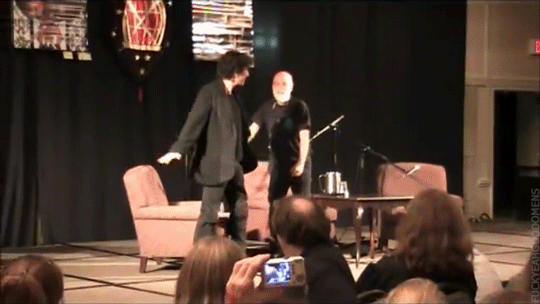
.
Fun fact: Neil wrote the 'Athaneema' into the Good Omens series :).
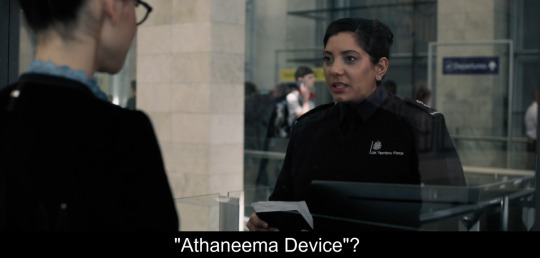
#good omens#terry pratchett#neil gaiman#terry and neil#interview#terry interview#neil interview#terry and neil interview#newt#anathema#athaneema#ep2#2i7#good omens movie#fun fact#videos#gointerviewedit#interview transcript#biggles#w e johns#transcripts
1K notes
·
View notes
Text
Another Sir Terry Pratchett interview on the details of writing Good Omens with Neil Gaiman. (More about this process x).
Question about how he goes about collaborating with someone else (Neil Gaiman).
Terry: “You make them do what you want”.
#good omens#crowley#terry pratchett#neil gaiman#aziraphale#ineffable husbands#good omens fun facts#good omens interviews#sir terry pratchett#this place is lacking on terry interviews
134 notes
·
View notes
Note
Hi Neil,
Do you have any fun stories about Terry Jones? Kinda feeling his loss a lot at the moment.
Terry Jones was the only person I ever interviewed as a young journalist who got me drunk. I was 23. He asked what I'd like to drink when I arrived and I said "coffee". He though about that for a moment and decided I would prefer Chablis, and a few moments later he produced a bottle of Chablis twice the size of a normal wine bottle and then proceeded to pour it into both of us while I interviewed him.
The interview was enormously fun (Terry was in the process of writing Labyrinth at the time.) After the interview the photographer and I went out for a pizza and I remember heading to the toilets and then lying on the floor while the room spun around, holding on to the floor because otherwise I might fall off.
7K notes
·
View notes
Text
The Final Fifteen is about Terry Pratchett's Death
read on Ao3
The final fifteen is obviously a major plot point, and serves a role in a story that was written long before Terry Pratchett was ever diagnosed with Alzheimer’s. But the scene itself wasn’t written until just a few years ago, during the writing of Season 2. In fact, the scene came about during a park bench conversation between Neil Gaiman and John Finnemore.
Others have noted that the non-romantic kiss that signals the story moving into the third act is a Neil Gaiman staple. The function of such a kiss, from Gaiman’s perspective, is to communicate.
In 2023 we are seeing a lot of stories written by men, for men, about men who are best friends and discover that their friendship can go deeper than the norms of society would usually allow; that platonic and romantic love are not so far apart, and perhaps the better word for a relationship that can be described this way is intimacy.
Neil Gaiman has made it clear in interviews that his friendship with Terry Pratchett was deeply intimate. They began collaborating on what would become Good Omens in the 1980’s, endured a tumultuous experience together through the first publication, wherein Neil offered to martyr himself on behalf of Terry if the book failed, and then spent the better part of two decades touring the world, meeting the people who loved their work. Neil would even off-handedly remark that Terry’s fans were so cheerful, and Neil’s seemed like they were ready to kill themselves; wouldn’t it be nice if they got married? From the outside, it looks very much as if Terry was Aziraphale-coded, and Neil was Crowley-coded, working together in an unexpected partnership to make the world a little bit more tolerable for the humans inhabiting it. I am not conjecturing that Neil and Terry had romantic inclinations the way their fictional characters do, but I think it is fair to say that their opposites-attract intimacy became an important part of who each of them were.
In 2007 Terry Pratchett was diagnosed with posterior cortical atrophy, a rare form of Alzheimer’s. As the disease progressed, he began to lose himself, and knew that the person he used to be was slipping away. He wanted to end his life on his own terms, and die as himself, but England did not and still does not allow for voluntary euthanasia or assisted suicide. He advocated for the right to die but never achieved it, and ultimately succumbed to the disease in 2015. Neil Gaiman has spoken a lot on the topic of death, and one answer of his that resonated with me reads:
Mostly it feels terrible. It even feels terrible when it’s someone who has been in a lot of pain for a long time or has not really been there for a long time and you know that Death has in some ways been a blessing: suddenly you are mourning the whole person.
It doesn’t get easier as you age. It gets stranger. The point where you realise how many people you used to know and like who aren’t there any longer, and you cannot talk to them or see them or laugh with them is painful in a way that I had never expected. The first time that someone you had a romantic relationship with dies and you realise that there had been moments both of you shared and now you are the sole custodian of those moments and one day you will be gone and they will be lost forever is peculiarly strange and hard.
~~~
The entire show is seeded with references to Terry Pratchett, but the most important one is the one that’s missing. Neil Gaiman cameoed as a sleeping moviegoer in S1E4, but a long time ago, he and Terry had discussed cameoing as sushi restaurant-goers, because sushi was weirdly prominent in the book. That cameo would have been in S1E1. But when it came time to do it, Neil couldn’t. Not without Terry.
Neil: I was gonna say our location is a Chinese restaurant we’d had turned into a sushi restaurant. So Terry and I, Terry Pratchett and I, had a standing… not even a standing joke, just a standing plan, that we were going to have sushi - there was going to be a scene in Good Omens where sushi was eaten and we were gonna be extras, we were gonna sit in the background, eating sushi while it was done. And I was so looking forward to this and, so I wrote this scene with it being sushi, even though Terry was gone, with that in mind and I thought: Oh, I’ll sit and I’ll eat lots of sushi as an extra, this will be my scene as an extra, I’ll just be in the background. And then, on the day, or a couple of days before, I realized that I couldn’t do it.
Douglas: You never told me this before either. I might have pushed you into doing it, had I known. I think you were right not to tell me.
Neil: I was keeping it to me self ‘cause I was always like: Oh, maybe I’ll be… this will be my cameo. And then I couldn’t. I was just so sad, ‘cause Terry wasn’t there. And it was probably the day that I missed Terry the most of all of the filming - it was just this one scene ‘cause it was written for Terry and all of the sushi meals we’d ever had and all of the strange way that sushi ran through Good Omens.
~~~
In the Final Fifteen, it is clear that Crowley and Aziraphale want to stay together. They love each other. They each know that the other loves them. There’s nothing that needs to be said, no convincing that their bond is true and real and precious.
But Aziraphale has to go to Heaven, and Crowley cannot follow him there.
I cannot speculate what it must have been like for Neil to endure losing a friend who, though I’m sure he desperately wanted to still be in his life, he also knew that life had become a burden to him, and grieved that Terry was not able to choose the time and manner of his departure from this Earth. This sort of complex grief, we fan-ficcers know, is the kind that is often best processed through story-telling.
I think that what we see Crowley going through in the Final Fifteen, alongside its importance to the story arc of Good Omens overall, is Neil processing his grief at losing his friend Terry Pratchett, and even the kiss, that violent, terrible, awful kiss, was the symbolic representation of Neil saying goodbye.
#neil gaiman#terry pratchett#aziraphale#crowley#good omens#good omens 2#good omens meta#ivoc#this meta ended up being only about 2/3 the length of my usual metas and somehow that feels appropriate because Terry's life ended too soon#and the jarring brevity of this piece parallels that feeling of sudden unexpected loss#for me anyways I don't know about you guys#if this made your eyes even slightly moist you are obligated to reblog to help someone else feel their feels#I don’t make the rules#but them is the rules#blessed by Beelzebub
869 notes
·
View notes
Text
Of parsnips and parsnip soup

So the question of parsnips, and particularly parsnip soup, came up secondary to this quote from an interview with Terry Pratchett. (Thanks to @captainfantasticalright for the transcription.)
Terry: “You can usually bet, and I’m sure Neil Gaiman would say the same thing, that, uh, if I go into a bookstore to do a signing and someone presents me with three books, the chances are that one of them is going to be a very battered copy of Good Omens; and it will smell as if it’s been dropped in parsnip soup or something in and it’s gone fluffy and crinkly around the edges and they’ll admit that it’s the fourth copy they’ve bought”.
And when @petermorwood saw this, he immediately reblogged it and added four recipes for parsnip soup.
These kind of surprised some folks, as not everybody knew that parsnips were an actual thing: or if they were, what they looked like or were useful for.
The vegetable may well be better known on this side of the Atlantic. (And I have to confess that as a New Yorker and Manhattanite, with access to both great outdoor food markets and some of the best grocery stores in the world, I don't think that parsnips ever came up on my personal radar while I was living there.) So I thought I'd take a moment to lay out some basics for those who'd like to get to know the vegetable better.
The parsnip's Linnaean/botanical name is Pastinaca sativa, and in the culinary mode it's been around for a long time. It's native to Eurasia, and is a relative to parsley and carrots (with which it's frequently paired in the UK and Ireland). The Romans cultivated it, and it spread all over the place from there. Travelers who passed through our own neck of the woods before the introduction of the potato noted that "the Irish do feed much upon parsnips", and in the local diet it filled a lot of the niches that the potato now occupies.
You can do all kinds of things with parsnips. The Wikipedia article says, correctly, that they can be "baked, boiled, pureed, roasted, fried, grilled, or steamed". But probably the commonest food form in which parsnips turn up around here is steamed or simmered with carrots and then mashed with them: so that you can buy carrot-and-parsnip mash, ready-made, in most of our local grocery chains.
It also has to be mentioned that most Irish kids have had this stuff foisted on them at one point or another, and a lot of them hate it. (@petermorwood would be one.) I find it hard to blame anybody for this opinion, as one of the parsnip's great selling points—its spicy, almost peppery quality—gets almost completely wiped out by the carrot's more dominant flavor and sweetness.
Roasting parsnips, though, is another matter entirely. They roast really well. And parsnip soups are another story entirely, as it's possible to build a soup that will emphasize the parsnip's virtues.
So, to add to Peter's collection, here's one I made earlier—like yesterday afternoon, stopping the cooking sort of halfway and finishing it up today.
I was thinking in a vague medioregnic-food way about a soup with roasted bacon in it, but not with potatoes (as those have been disallowed from the Middle Kingdoms for reasons discussed elsewhere. Tl;dr: it's Sean Astin's fault). And finally I thought, "Okay, if we're going to roast some pork belly or back bacon, then why not save some energy and roast some parsnips too? The browned skins'll help keep them from going to mush in the soup."
So: first find your parsnips. I used four of them. You peel them with a potato peeler...

...sort of roughly quarter them, the long way...
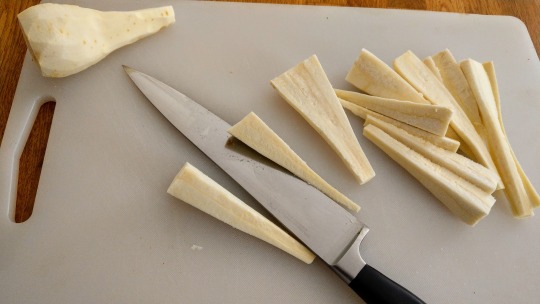
...then chop them in half the short way, toss them in a bowl with some oil—olive oil, in this case—spread them on a baking sheet, and season them with pepper, coarse salt, and some chile flakes. (I used ancho and bird's-eye chile flakes here.)
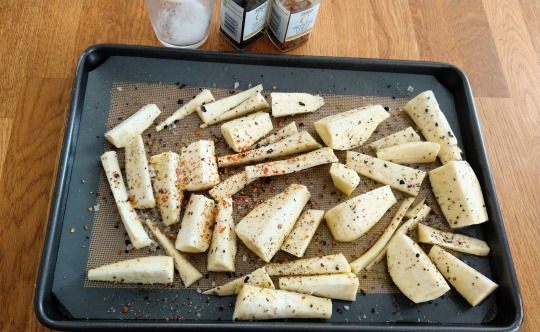
These then went into the oven for about half an hour, and came out like this.

While that was going on, I got a block of ready-cooked Polish snack bacon out of the freezer.
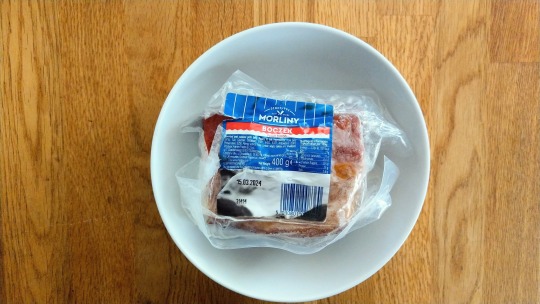
On its home turf, this is the kind of thing that turns up (among other ways) sliced very thin on afternoon-snack plates, with cheeses and breads. But we like to score it and roast it to sweat some of the fat out, and then use it in soups and stews and so forth.
So I scored this chunk on most of its sides, browned it in a skillet, then shoved the skillet into the oven for twenty minutes or so. Here's the bacon after it was done.
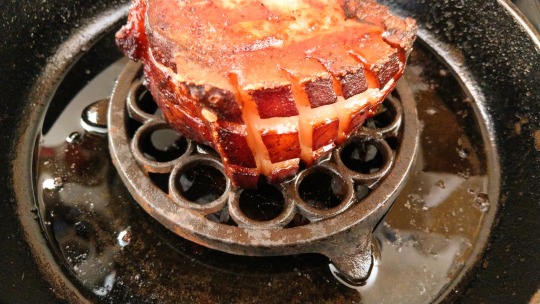
While it was cooking, I made about a liter of soup stock from a couple of stock cubes. If you can get pork stock cubes, they'd be best for this, but beef works fine.

This then went into the pot and was brought up to just-boiling while the bacon and the parsnips were chopped into more or less bite-sized chunks. After that, the meat and veg were added to the pot and the whole business was left to simmer for a couple of hours while I went off to do some line editing.
Finally I turned it off and left it on the stove overnight (our kitchen is quite cool, it was in no bacteriological danger from being left out this way) and then finished its simmering time around lunchtime today.
And here it is. (...Or was. It was very nice.)
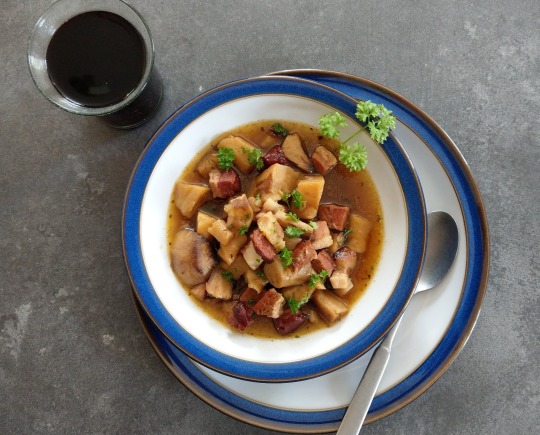

...Anyway, this is only one of potentially thousands of takes on parsnip soup. Recipes for more robust versions—based on mashed parsnips and more vegetables, or different meats—are all over the place.
Meanwhile, as regards how much damage this soup could do to your copy of Good Omens if you dropped yours in it, I'd rate this at about 5 damage points out of 10. ...Call it 5.5 if you factor in the chiles. Soups along the boiled-and-mashed-parsnip spectrum would probably inflict damage more in the 7.50-8.0 range. But your results may vary: so I'll leave you all to your own experimentation.
382 notes
·
View notes
Text
"My nerve curve was pretty exponential because I wasn't - unlike Michael - I didn't really know the world of, the fandom of the book, somehow it had passed me by," he said, in an interview alongside Sheen before the actors' strike was announced.
Sheen interjects, asking his co-star: "And how's your nerve curve now?"
"I'm pretty chill," says Tennant.
“I saw it the other day, it looks marvellous," Sheen replies.
Oh, Michael!
#david tennant#Michael sheen#good omens#david tennant dilf#Michael sheen dilf#aziracrow#ineffable husbands#inevitable ineffable husbands#david and michael#David and Michael interview#good omens season 2
198 notes
·
View notes